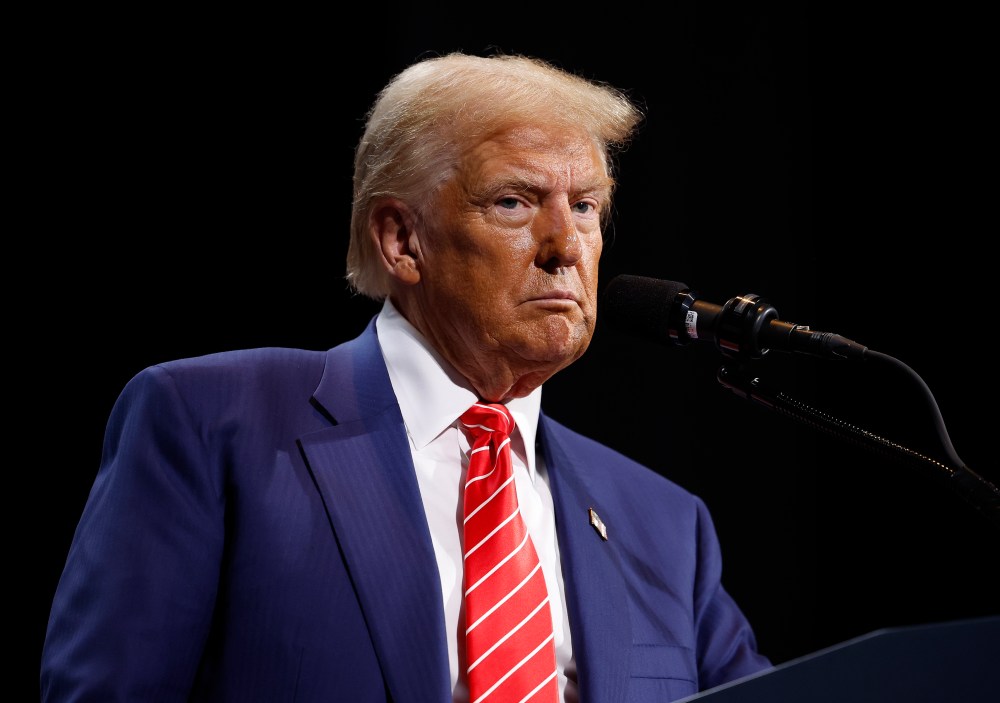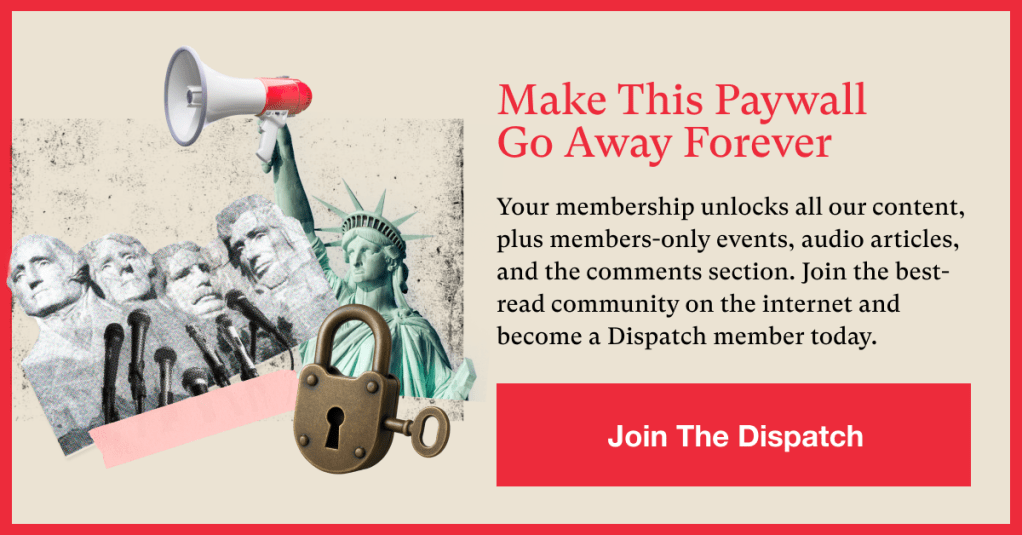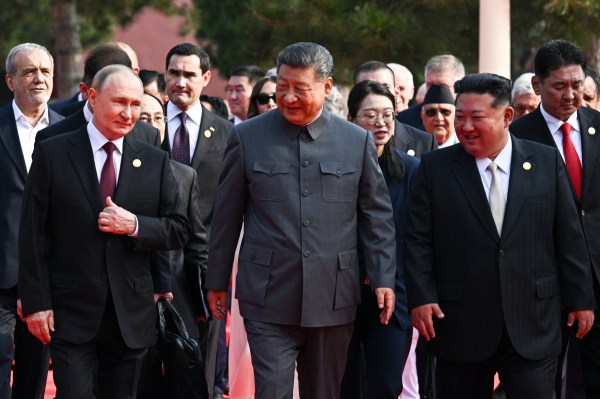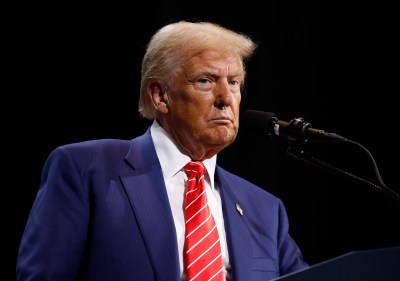Every day, I complain that Americans aren’t mad about the things they should be mad about, and almost every day, I neglect to mention the very important thing that they are mad about.
To all appearances, the silent majority doesn’t care that our government increasingly behaves like China’s. They don’t care that it’s experimenting with socialism. They don’t care that the administration sets global trade policy by autocratic whim, without much rhyme or reason. They don’t care that it’s using American soldiers to police American cities and masked men in quasi-military kit to snatch people off the streets and pack them off to God knows where. And they don’t care that the party that’s in charge of Congress doesn’t care either.
The silent majority doesn’t care if the United States is governed by fascists. But they do care about the price of groceries.
On Thursday, the Labor Department reported that the producer price index rose nearly an entire percentage point in July, the biggest increase since 2022 and far above what economists had predicted. On Friday, the latest monthly consumer sentiment survey detected more bad vibes, recording the first decline since April and revealing that expectations for inflation in the coming year have leapt from 4.5 percent to 4.9 percent.
As a non-paying reader, you are receiving a truncated version of Boiling Frogs. You can read Nick's full newsletter by becoming a member here.
That would be ominous for the president even if he had a reservoir of political capital on this subject that he could tap to get him through the turbulence. He doesn’t.
CNN’s Harry Enten reported a few days ago that the GOP’s advantage on inflation has evaporated. Republicans led Democrats by 13 points on that issue before the 2022 midterms; now Democrats lead by 1. Donald Trump topped Kamala Harris by 9 points in exit polls last November when voters were asked who would better handle the issue. Today, the president is 25 points underwater on the subject in the polls Enten is tracking.
Data analyst G. Elliott Morris says it’s even worse than that. Trump’s numbers on inflation are now as bad as Joe Biden’s were when prices began to surge three years ago. His net approval on this issue is his lowest out of 11 major topics polled, and it’s happening at a moment when roughly as many Americans say that jobs and inflation are their top priority as said so during the low point of Biden’s presidency. The country is waiting impatiently for things to get cheaper, and Trump isn’t delivering.
His overall job approval remains respectable-ish at 43.7 percent in Nate Silver’s average, but there’s reason to think that won’t last. A new survey released yesterday by Pew Research placed him at just 38 percent approval, with notable declines among some swing demographics that warmed up to him last fall. According to the poll, the president has fallen 25 points since February among those aged 18-34 who voted for him in November and now stands at 27-70 in approval among Hispanics, a group that gave him 48 percent of its vote in the election.
Inflation has the potential to eat his presidency alive. It’s political “gravity” in its purest form: If you make voters materially worse off, their disdain for you will grow until the weight of your unpopularity crushes your ability to influence events. Lame ducks don’t get any lamer than when they’ve been maimed by a high cost of living.
At least, that’s how gravity is supposed to work.
A spiral?
For two reasons, Trump is more vulnerable to a backlash over high prices than even Joe Biden was. One is that he was elected to solve this problem.
Biden was not. He owed his victory to a craving for political normalcy after four years of Trump and eight months of COVID. The president, on the other hand, owed his victory last year to a craving for economic normalcy after three years of inflation not seen since the 1980s. He pointed to the pre-pandemic job growth of his first term as proof that he has a Midas touch, and enough voters believed him to give him his job back.
If inflation gets worse on his watch, all of that is up in smoke. Not only would he have failed to do the thing he was elected to do, but his dopey image as some sort of “economy whisperer” will collapse. He’s at risk, finally, of a real “the emperor has no clothes” moment.
The other reason he’s in bigger trouble than Biden, of course, is tariffs.
The Biden administration made inflation worse by approving a new round of COVID stimulus in 2021, but it could also fairly point to global pandemic disruptions that were beyond its control as a key factor. Inflation is colloquially defined as “too much money chasing too few goods,” and lingering supply-chain chaos from lockdowns assured that there were too few goods. In fact, some European countries saw higher rates of inflation than the United States did.
There was no equivalent in Biden’s economic program to the role that tariffs play in Trump’s. They’re the centerpiece of his agenda, something he talks about in almost mystical terms, even though the point of them is to make daily life more expensive for the average joe and is widely understood to do so. I can’t think of another case of an American politician celebrating taxes as enthusiastically as the president celebrates tariffs, apart from Bernie Sanders chirping about soaking billionaires.
And Bernie’s tax is at least progressive. Trump’s tariffs are coming for the working class.
Never in my life has a leader tried to rally the public behind the idea that it’s good when blue-collar people have to pay more at the store, to the point where the president began scolding Americans earlier this year for wanting their children to have 30 dolls to play with instead of one or two. He’ll “own” high prices politically over the next three and a half years to a degree that politicians rarely own any issue.
His sycophants will do their best to spin for him by assuring Americans that inflation and tariffs are different things and that the latter isn’t causing the former, but this is a rare case where the public’s ignorance will work against the president. In the end, no one will care precisely why everything costs 20 percent more at the supermarket. All they’ll know is that they elected Trump to make things cheaper and, for the stupidest ideological reasons, he deliberately undertook to do the opposite.
As much as the country hates his program now, wait a few months until businesses can no longer afford to “eat” as much of the tariff costs as they currently do and start passing most of those costs along. If it turns out that I’ve been too pessimistic in my newsletters in thinking that Americans can and will rationalize any Trump failure, this is where I’ll be wrong. A spike in the cost of living really might be where they draw the line.
It could even cause the president—and the economy—to spiral.
We’ve never seen what it looks like when Trump has to manage a protracted economic crisis of his own making, with his reputation as some sort of financial whiz crumbling around him in real time. I’ll bet his reaction to the disappointing jobs report earlier this month is a reliable sneak preview, though. If the economy tanks, he’s going to freak out and start acting on strongman instinct, hoping to brute-force his way out of the immense political jam he’s put himself in.
Should the various monthly numbers continue to make him look bad, he’ll fire the people who report them and replace them with hacks willing to lie. As the economy cools down, he’ll pressure the Federal Reserve to cut interest rates even at the risk of accelerating already-rising inflation. Then, as prices continue to climb, he’ll start bullying manufacturers to cut them—threatening them if they refuse by accusing them of disloyalty and ultimately forcing them by imposing federal price controls under some dubious “emergency” authority.
It’ll be one politicized distortion of the economy on top of another, an endless game of inflation whack-a-mole that won’t actually solve the problem and will almost certainly make it worse. That’s Trumpism for you: You don’t need results, just a spectacle of intervention that makes you appear proactive.
All of this could plausibly lead to weak economic growth and really high prices. Imagine Trump’s Ministry of Truth barfing up comically inflated jobs numbers each month while Americans are steadily ground down by stagflation. He might become deeply, durably unpopular.
What then?
Going for broke.
In a democracy, this is where gravity would set in.
A leader whom voters have grown to dislike is, by design, a weak leader. He exerts less control over daily politics than he did when he was popular because elected officials in his party no longer have an incentive to obey him. Depending on how unpopular he is, they might even profit in their next campaign by distinguishing themselves from him. Nothing makes politicians more “independent-minded” than being saddled with a president whom the electorate hates.
An unpopular leader also has less freedom of political movement. Gambits that would have seemed “bold” to voters when they liked him and looked for excuses to give him the benefit of the doubt may appear dubious once they’ve lost faith. My point earlier about Americans not caring about fascism carries an asterisk: They don’t care about it when the economy is strong. When it isn’t, they may have less patience for such things.
And so a president who’s prone to radicalism may become less prone as his support weakens. He won’t want to risk making himself more unpopular and igniting an intense backlash, particularly if he cares about his party’s chances at the polls. If We the People don’t like you, your power to impose your political will in our name declines: That’s elementary political gravity in a democracy.
But do we think that’s what would happen in Donald Trump’s America if inflation soars and his job approval lands in the toilet?
I do not. I suspect the president would become more radical and domineering, not less.
Psychology is destiny. Only once since he entered politics have we seen Donald Trump truly cornered, with no way to talk or bully himself out of a situation, and he did not react well. His behavior after the 2020 election has always seemed less like a matter of him executing a strategy, however ineptly, than him having a mental breakdown in public view as his narcissism buckled under the reality of his political mortality.
An inflation crisis that shatters his image as an economic savior and turns the public harshly against tariffs may be the closest we get to another episode like that. Here, as before, his instinct as he feels his political influence ebb will be to resist by being as domineering as possible. If you try to take his power from him, he’ll resolve to be twice as aggressive in protecting it.
Normally, that alone wouldn’t be enough to overcome political gravity. Congressional Republicans would still run away from him in their next elections to avoid being burdened by his unpopularity. But none of us thinks that’s very likely either, right?
Even in an America where Trump’s job approval falls to 30 percent, that 30 percent would account for a majority of the GOP. And the president would leverage that as ruthlessly as possible to try to keep members in the House and Senate obeisant to him. The threats against Republicans who dare to defy him would get louder and more menacing. Trump would tell MAGA voters that the supposed economic downturn they’re hearing about in the news is a media hoax and that their local representative is a traitor to the cause for going along with it.
And many of those voters would believe him. If you were one of those “traitor” House Republicans, how confident would you feel about defeating a primary challenger backed by a seething Trump in the circumstances I’ve described, even in the middle of a recession?
I don’t think the president would be less likely to act “boldly” in office as his popularity declines, either, as his predecessors might have been. To the contrary.
He’s more likely to try to fire Fed Chairman Jerome Powell or deploy the Marines to “clean up” Chicago amid an economic tailspin than at a moment when the monthly jobs numbers are climbing modestly. Trump would believe, not unreasonably, that the way to stop the bleeding in the thick of an inflation crisis is to give his base a reason to rally behind him against their shared cultural enemies. A recession is worth tolerating in the name of purging the Smithsonian of wokeness!
More than that, though, watching his approval go down in flames would convince him that there’s nothing left to lose by shedding his remaining inhibitions against authoritarianism. Ideally, he would “save the country” with the undying support and gratitude of the people. But if the people are too fickle and disloyal to stick with him as he makes America great again, one unaffordable import at a time, well, he’ll just have to do it without them.
Faced again with his political mortality, this time due to an economic crisis, I think he would go for broke.
What that would look like is better left to imaginations darker than mine, but I’ve been warning for ages in this newsletter that there’s no chance he and his party will willingly relinquish power in 2028 if they lose that election. They resisted it in 2020, and they weren’t half as ruthless then as they are now. And the model of government they’re building, in which all sectors of society ultimately comply with the leader’s wishes, simply isn’t one that’s meant to be transferred to the opposition.
I suspect that a Trump-caused economic calamity that made Democratic victory in 2028 seem like a foregone conclusion would cause the president and his team to drop all pretenses that they’ll step aside if defeated. An “emergency” might be contrived to justify their continued rule; ironically, the economy itself could provide it. “Democrats will lift the president’s price controls if they take power and make it even harder for American families to make ends meet. We can’t allow it!”
If that speculation sounds like “Trump Derangement Syndrome” to you, fair enough. Believing that he’d attempt a coup if he lost in 2020 was also deranged, I was assured at the time.
A postliberal regime that governs a population that remains liberal-ish on balance will pay lip service to democracy, but the point of postliberalism is to guarantee outcomes irrespective of process. Democracy is a process: Whoever gets the most votes wins. Postliberalism is a result: The fascists win, if not democratically then by whatever method gets the job done.
That’s how Trump and his administration will treat their hold on power if and when the economy erodes. Republicans must remain in charge in 2029; we can do that the easy way, by electing the GOP despite Americans’ anguish over stagflation, or we can do it the hard way.
Political gravity works in democracies. If gravity in your own country no longer applies, you’re not living in one.








Please note that we at The Dispatch hold ourselves, our work, and our commenters to a higher standard than other places on the internet. We welcome comments that foster genuine debate or discussion—including comments critical of us or our work—but responses that include ad hominem attacks on fellow Dispatch members or are intended to stoke fear and anger may be moderated.
With your membership, you only have the ability to comment on The Morning Dispatch articles. Consider upgrading to join the conversation everywhere.